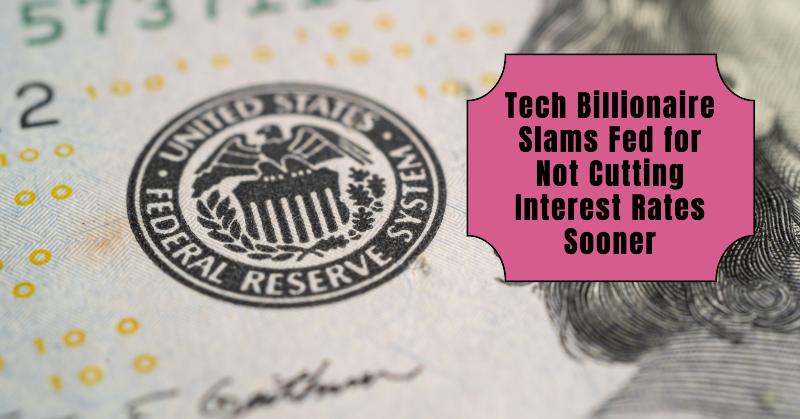The tech titan and entrepreneur, Elon Musk, has once again stirred the financial pot. His latest salvo? A blistering critique of the Federal Reserve's interest rate strategy. The billionaire CEO hasn't shied away from labeling the Fed's actions as “foolish,” igniting a fresh round of debate on the economic tightrope we're all walking. Is Musk a visionary ahead of his time, or is this just another billionaire's opinion?
He is clearly expecting a correction of some kind or otherwise simply cannot see better investments than Treasury bills.
The Fed needs to drop rates. They have been foolish not to have done so already.
— Elon Musk (@elonmusk) August 4, 2024
Elon Musk Says Fed Foolish Not to Have Cut Interest Rates
Why Interest Rates Matter
Interest rates are a crucial component of economic health, affecting everything from borrowing costs for businesses and consumers to the overall performance of financial markets.
- Lower Interest Rates: Typically encourage borrowing and investing, which can lead to economic growth. When companies and individuals can borrow at lower costs, they are likely to spend more, stimulating demand for goods and services.
- Higher Interest Rates: Conversely, tend to dampen spending. Increased costs for loans can lead potential homeowners or businesses to delay purchases or expansion, which can result in slower economic growth.
Musk's Critique of the Fed's Strategy
Elon Musk's comments come amid a tumultuous period where discussions around inflation have intensified. Musk believes that the Fed’s reluctance to lower interest rates could lead to missed opportunities for economic improvement. A recent Fortune article highlighted his view, emphasizing that maintaining higher rates at a time of economic stress was not beneficial. Musk pointed out:
“It seems foolish not to cut rates. What's the downside?”
This question encapsulates a broader sentiment shared by various experts and analysts who argue that aggressive rate cuts could be necessary to revitalize consumer spending and investment.
The Economic Landscape: Why Now?
As of August 2024, the U.S. economy is facing hurdles including disappointing jobs reports and mixed signals from various sectors. According to ABC News, there is mounting pressure on the Fed to consider rate cuts in their upcoming meetings, a move that could alleviate financial strain for numerous businesses and individuals.
Musk's perspective aligns with concerns among economists about the potential risks of delaying such decisions. The repercussions of maintaining high rates may include:
- Stagnant Economic Growth: If borrowing remains too expensive, businesses may hold back on investments necessary for expansion.
- Job Market Instabilities: High-interest rates can stifle job creation as companies resist expanding their workforce with increased operational costs stemming from higher loan payments.
- Consumer Spending Declines: Higher rates make credit cards and loans more costly, which tends to reduce overall consumer spending.
What Do Experts Say?
Reactions to Musk's statements have varied among financial analysts and economists. Some support his call for rate cuts, arguing that the inflation rates have been cooling and that now might be the right time for the Fed to act. Others caution that premature cuts could jeopardize the gradual progress made against inflation.
Neel Kashkari, President of the Minneapolis Fed, recently shared insights on future rate cuts. In an article on MarketWatch, he mentioned the Fed's cautious stance due to lingering inflationary pressures, emphasizing that the Fed's decisions should be data-driven rather than emotional.
The Importance of a Data-Driven Approach
Musk's passionate opinions may stir discussions, but it's essential to remember that the Fed's decisions rely on extensive data analysis. Some key metrics include:
- Inflation Rates: Currently, inflation is showing signs of cooling, which may prompt the Fed’s reconsideration of their interest rate strategy.
- Employment Figures: Strong employment data could potentially encourage the Fed to hold off on rate cuts.
- Consumer Confidence: If consumers feel secure in their financial situations, they are likely to spend more, which can stimulate growth, possibly diminishing the argument for cuts.
The Potential Aftermath of Rate Cuts
If the Fed decides to cut interest rates, the implications could be significant.
- Boost in Investments: Lower rates can make it more appealing for companies to invest in new projects and technologies.
- Increased Consumer Spending: With cheaper loans, consumers might venture into purchasing homes or cars, thus invigorating various markets.
- Stock Market Reactions: Typically, anticipations of rate cuts often lead to higher stock market performance as investors expect increased corporate profitability.
Conclusion: Navigating a Complex Terrain
Elon Musk's assertion that the Fed is “foolish” not to cut interest rates opens up vital discussions on economic strategy and future recovery. While Musk's perspective lends a voice to many who are affected by high borrowing costs, it is crucial that the Fed balances his thoughts against a broader array of economic indicators.
In addressing these concerns, the Fed will need to remain vigilant and responsive to economic changes, ensuring that any interest rate adjustments promote stable growth without unnecessary inflationary rebounds. For now, stakeholders—including policymakers, investors, and the broader public—are left to ponder Musk's provocative statement while keeping a keen eye on the Fed’s forthcoming decisions.
ALSO READ:
- How Low Will Interest Rates Go in 2024?
- Interest Rate Predictions for the Next 3 Years: (2024-2026)
- Interest Rate Predictions for Next 2 Years: Expert Forecast
- Interest Rate Predictions for Next 10 Years: Long-Term Outlook
- When is the Next Fed Meeting on Interest Rates in 2024?
- Interest Rate Cuts: Citi vs. JP Morgan – Who is Right on Predictions?
- More Predictions Point Towards Higher for Longer Interest Rates



